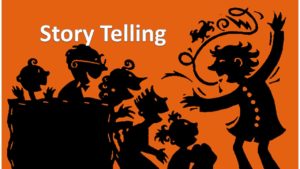How to Tell Stories in Your Presentation
Telling stories in y our presentation
our presentation
The best speakers are storytellers. Tell stories to engage your listeners and make your point. Stories can help build trust with your listeners. If the story is funny – that is a bonus. Don’t tell a story just because you find it funny. That does not serve your purpose.
The best stories are your personal stories. Why? Because it is easier for you to remember. If you lived the experience then you are able to add colour to the story that makes it more vivid and real in the minds of your audience. The best visual is in the mind of your listeners. Your stories allow you to paint word-pictures in their minds. That is a powerful way to engage, motivate and help them remember your message. Facts are mostly boring – stories can be captivating and incredibly memorable.
Where can you find more stories?
You
The best source because the story is uniquely yours. Your mistakes, failures and embarrassing moments make the best stories. These make the most entertaining stories. These stories help you connect with your audience because they get to laugh at you and you demonstrate how you are like them – imperfect.
Family
Effective because everyone can relate to family. The activities of your family can provide you with many powerful stories. The observations and antics of children and grandparents can be the source of entertaining, emotional and insightful stories.
Community
What happened around you? You might find good stories from the things you see and do in your neighbourhood, volunteer work, associations, place of worship and work.
Entertainment
Many listeners in your audience will nod their heads as you connect through modern culture. Use anecdotes, metaphors and analogies from popular movies, TV shows, music, books and sports. A special note to men – too many men-sports analogies can quickly alienate the women in your audience.
News/History
Explorers, heroes and little known facts can make for interesting and purposeful stories.
Always have a handful of stories ready to use. Your stories can be a lifesaver when you are asked to speak on the spur of the moment, you are asked difficult questions or the direction of your presentation suddenly changes.
Tips on telling stories
- Have a clear point to your story
- Place your listener in the story
- Make the story as short as possible
- Dramatize your story
- A funny story is a bonus – but not necessary
- Make the story emotional or visual – or both
- Leave out details that don’t contribute to your purpose
- It is okay to alter pieces of the story if it suites your purpose
- Every story should have a conflict, resolution and point
- Collect stories – notice what happens around you
- Keep prepared stories ready for your main messages
- Don’t be the hero of all your stories
- Rehearse and refine your stories
How to become a more powerful speaker? Tell more stories.
For more insights and ideas on storytelling, listen to these conversations with master storytellers on the podcast, Your Intended Message.
https://www.linkedin.com/pulse/storytelling-lessons-you-george-torok/
With excerpts from “Secrets of Power Presentations” by Peter Urs Bender.
How to tell stories in your presentation
Related posts for you
Put the audience in your stories
How can Toastmasters help your public speaking skills

